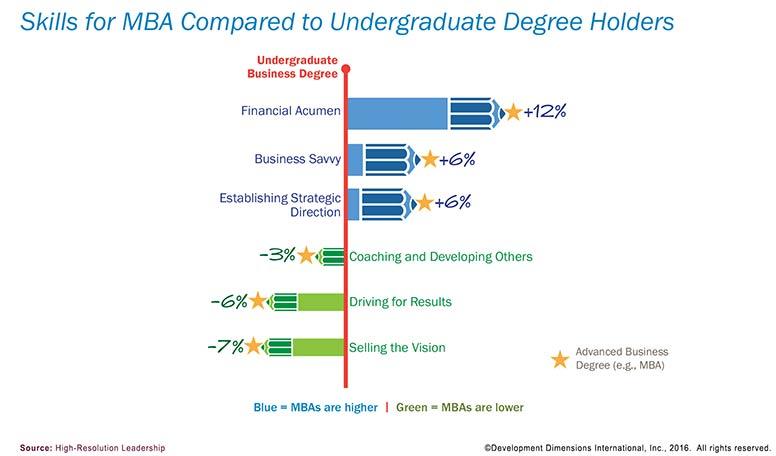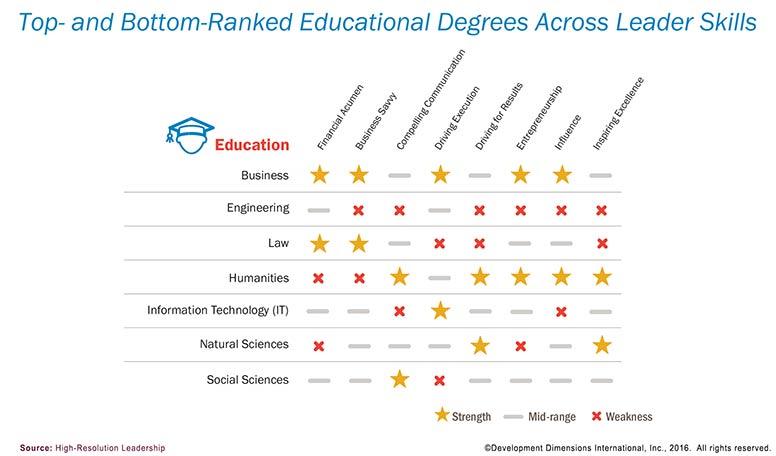New Research from DDI Looks at Different Undergraduate- and Graduate-level Degrees and How They Translate into Leader Skills and Performance
Mumbai April 27, 2016—The Master of Business Administration (MBA) has become the most popular degree among graduate students with hundreds of thousands of students graduating each year, according to the latest figures from the U.S. Department of Education. The cost for these degrees can be up to $100,000 or more at top universities and companies pay a premium for those who have them—on average, about 36 percent more than a candidate with a bachelor’s-level business degree with a similar level of experience. But there is limited research on how these degrees translate into leadership skills. The question remains, do MBA graduates make the best leaders?

Important Announcement – EasyShiksha has now started Online Internship Program “Ab India Sikhega Ghar Se”

The scientists at Development Dimensions International (DDI), a global leadership development consultancy, examined how educational degrees translate into leadership skills in a new report, High-Resolution Leadership. The research is based on 15,000 leaders across 300 companies and 18 countries who participated in assessment center evaluations over the last nine years. The research found that when it comes to the full range of leadership skills required in today’s complex business environment, an MBA may not always be the best choice, according to lead author Evan Sinar, Ph.D., DDI’s Chief Scientist and Director, Center for Analytics and Behavioral Research. “MBA degrees did indeed make better managers,” said Sinar. “Unfortunately, the same couldn’t be said for their impact on stronger leadership.”
Top Courses in Software Engineering
DDI’s research compared the performance of undergraduate business degrees and MBA degree holders against eight leader skills: financial acumen, business savvy, compelling communication, driving execution, driving for results, entrepreneurship, influence and inspiring excellence. These two groups diverged on several key leader skills. Specifically, though MBA graduates consistently outperformed business degree undergraduates in financial acumen, business savvy and strategic decision making, they fell short comparatively in their coaching, results orientation and visionary leadership skills.
“While management skills are consistently higher for MBA graduates, we were surprised to find there are several skills that are lower,” Sinar said. “These are significant shortcomings when you consider the cost of the investment,” he added.
“The research demonstrates that MBA students need more well-rounded background and experiences to learn the important interaction and inspirational skills they will need to truly excel as leaders,” said Sinar. “These skills are developable with sustained focus, but can’t be learned in an academic classroom. Skills practice with employees, expert coaching/mentoring and abundant on-the-job application opportunities are critical to make these challenging skills stick,” he said.

Which undergraduate degrees produce the best leaders ?

According to Sinar, educational degrees both inform and mislead potential employers about leadership skills at the same time. Business degrees are the most common among all senior leaders and, when tested against eight key leadership competencies, outperformed other degrees on five of eight key leadership skill areas. Humanities graduates also outperformed other degrees through strengths not only in interpersonal competencies, but also in results orientation and entrepreneurship. Engineering graduates face a heavy disadvantage—they were near the bottom in leadership proficiency in six of the eight assessed competencies. Natural science, social science and IT were near average.
“Our advice for graduates with degrees that are missing key leadership skills is to supplement coursework with hands-on opportunities through targeted learning programs and developmental assignments,” said Sinar. “A job candidate with the skills that his/her degree counterparts lack will have to recognize that assumptions may be made about his/her lack of leadership skills. For them, it will be particularly important to find ways to demonstrate these capabilities to overcome hiring biases—and to differentiate yourself from others holding the same degree, to gain an advantage in the job hunt.”
Balance Technical Expertise and Interpersonal Skills
For aspiring leaders, it’s important to strike a balance between the critical technical expertise that most undergraduate degrees provide, with an awareness of common skill gaps that, if left unchecked, will limit overall leadership effectiveness and career mobility. Many degree programs put a heavier focus on developing graduates’ technical abilities, and much less emphasis on interpersonal and leadership skills. Though some degree programs fill this gap with group projects and informal leadership opportunities, it’s often up to the student to plan for and seek out these opportunities. Engineering, law, IT, and natural sciences graduates are particularly likely to fall behind their peers from other degree backgrounds in leadership skills. This isn’t always a problem when graduates start out at a new job as an individual contributor, but can hold them back when they want to move into a management position. It’s also a way to set a candidate apart from the pack of other graduates in the field, if they have put the time and effort into gaining the skills others lack.
Sinar’s advice: “Get as much information as you can—using your career planning office if you’re still in school, or working with your HR department once you’re in a job—to know your leadership-related strengths and weaknesses and invest in development opportunities to give you the skills you’ll need and plenty of time to practice them before you need them.”
About DDI’s High-Resolution Leadership
About Development Dimensions International
Empower your team. Lead the industry
Get a subscription to a library of online courses and digital learning tools for your organization with EasyShiksha
Request NowQ. Are EasyShiksha's internships truly free?
Yes, all internships offered by EasyShiksha are completely free of charge.
Q. How can I apply for an internship with EasyShiksha?
You can apply by visiting our website, browsing available internships, and following the application instructions provided.
Q. What types of internships are available through EasyShiksha?
EasyShiksha offers a wide range of internships across technology, business, marketing, healthcare, and more. Opportunities are continuously updated.
Q. Will I receive a certificate upon completing an internship?
Yes, upon successful completion, you will receive a certificate recognizing your participation and achievements.
Q. Are EasyShiksha's internship certificates recognized by universities and employers?
Yes, the certificates are recognized by universities, colleges, and employers worldwide.
Q. Is the download of certificates free or paid?
Access to internships and courses is free, but there is a small fee to download certificates, covering administrative costs.
Q. When can I start the course?
You can choose any course and start immediately without delay.
Q. What are the course and session timings?
These are fully online courses. You can learn at any time and pace. We recommend following a routine, but it depends on your schedule.
Q. What will happen when my course is over?
After completion, you will have lifetime access to the course for future reference.
Q. Can I download the notes and study material?
Yes, you can access and download course materials and have lifetime access for future reference.
Q. What software/tools would be needed for the course?
All necessary software/tools will be shared during the training as needed.
Q. I’m unable to make a payment. What should I do?
Try using a different card or account. If the problem persists, email us at info@easyshiksha.com.
Q. Do I get the certificate in hard copy?
No, only a soft copy is provided, which can be downloaded and printed if required.
Q. The payment got deducted but shows “failed”. What to do?
Technical errors may cause this. The deducted amount will be returned to your account in 7-10 working days.
Q. Payment was successful but dashboard shows ‘Buy Now’?
Sometimes payment reflection is delayed. If it takes longer than 30 minutes, email info@easyshiksha.com with the payment screenshot.
Q. What is the refund policy?
If you face technical issues, you can request a refund. No refunds are issued once the certificate has been generated.
Q. Can I enroll in a single course?
Yes, select the course of interest, fill in the details, make payment, and start learning. You will also earn a certificate.
Q. My questions are not listed above. I need further help.
Contact us at info@easyshiksha.com for further assistance.
ALSO READ: dr koshy selected holden medal
Get Course: Managerial Computing Tutorial




































































